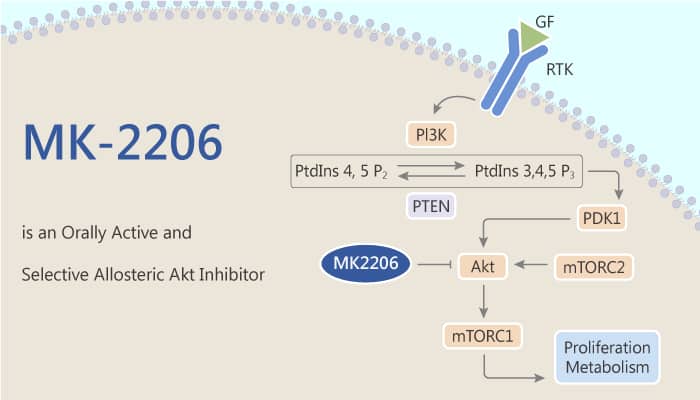Nasopharyngeal carcinoma (NPC) is a squamous cell carcinoma arising from the epithelium lining of the posterior nasopharynx. In a word, NPC causes very serious health problems in these areas. NPC is highly sensitive to radiation and chemotherapy. However, even with combined radiation and chemotherapy treatment, the prognosis for the metastatic form of NPC is not ideal. Therefore, there is an urgent need to improve NPC treatment, especially targeted therapy. In NPC, the PI3K/Akt signaling pathway plays an important role in pathogenesis, and Akt promotes cell proliferation and survival. Akt is deregulated in NPC as described earlier. Therefore, it could be a potential target for cancer treatment. In this study, MK-2206 is an orally active allosteric Akt inhibitor, with IC50s of 8, 12, and 65 nM for Akt1, Akt2, and Akt3, respectively. The same to MG-132, MK-2206 is also an autophagy inhibitor.

In vitro, MK-2206 inhibits NPC cell lines CNE-1, CNE-2, HONE-1, and SUNE-1 proliferation in dose- and time-dependent manner. Moreover, it results in a dose-dependent increase in the percentage of cells in G0/G1 phase and a concomitant reduction of cell numbers in the S phase in CNE-2 and HONE-1 cells. In addition, MK-2206 attenuates phosphorylation levels of PRAS40 and S6 in a dose-dependent manner. MK-2206 does not affect the phosphorylation of GSKα/β and Akt. MK-2206 increases the appearance of LC3-II in CNE-2 cells dose-dependently. Microtubule-associated protein 1 LC3 is an essential autophagy protein.
In vivo, MK-2206 can inhibit the growth of human CNE-2 xenografts in nude mice. No other obvious toxicity is observed in mice.MK-2206 significantly inhibits tumor growth in 3-5 week old athymic nude mice with GEO colon carcinoma cells.
In a word, MK-2206’s antiproliferative effect may be useful for NPC treatment.
Reference:
Zhao YY, et al.Drug Des Devel Ther. 2014 Oct 10;8:1827-37.